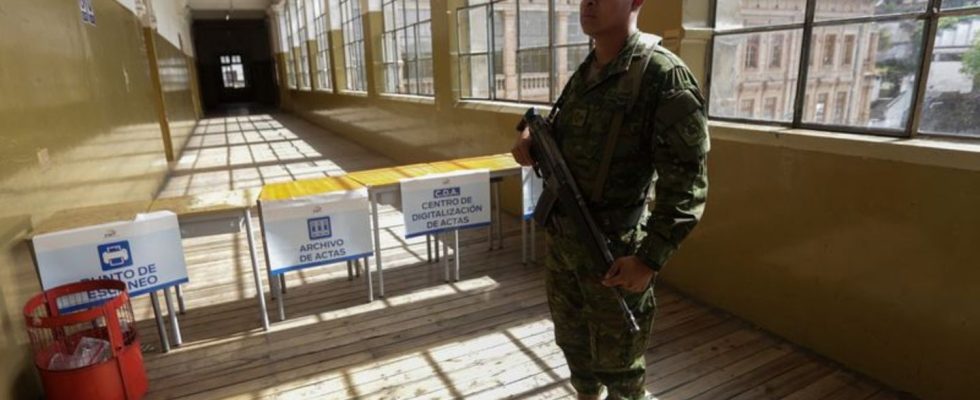Government
Presidential election in Ecuador: Runoff election in October?
A soldier guards the aisles of Colegio Mejía, one of the main election centers in the Ecuadorian capital. photo
© Juan Diego Montenegro/dpa
In the presidential elections in Ecuador, according to initial forecasts, a runoff between left-wing politician Luisa González and banana entrepreneur Daniel Noboa is surprising.
Overshadowed by the murder of a candidate and under heightened security Ecuador voted on a new president. After counting a good 92 percent of the votes, left-wing politician Luisa González from the camp of ex-president Rafael Correa (2007 to 2017), who was convicted of corruption, was ahead with 33.27 percent. This emerged from the website of the electoral authority CNE early Monday (local time).
Banana entrepreneur Daniel Noboa followed in second place with 23.69 percent – according to media reports, his performance came as a big surprise: he was far behind in previous surveys.
There will be a runoff between González and Noboa if neither presidential candidate wins an absolute majority or at least 40 percent of the vote by 10 percent over the runner-up. The electoral authority named October 15 as the date for this.
Ecuador suffers from a wave of violence
A total of eight candidates applied for the highest office in the country shaken by a wave of violence between the coca-growing countries of Peru and Colombia. The German-born former Vice President Otto Sonnenholzner recognized his defeat early on. In addition to the head of state, the members of the national assembly of the country with a population of 17 million were also up for election. In addition, two referendums on oil production in the Amazon region and mining in the cloud forests near Quito were up for vote.
Thanks to the joint work of the armed forces and the police, as well as more than 40,000 election workers, Democracy Day passed in a completely calm and peaceful manner, said the head of the South American country’s electoral authority, Diana Atamaint, at the start of the count on Sunday evening.
“There is a climate of fear”
Around ten days after the assassination of opposition candidate Fernando Villavicencio, the situation was calm but very tense, as political analyst Andrés González told the German Press Agency. “The elections are now suddenly a dangerous event, there is a climate of fear. This situation is alien to us. It has never been so scary when you go to a polling station.”
Voters would look around uncertainly, suspicious cars checked. Candidates wore bulletproof vests and were surrounded by security forces to vote, while the military showed an increased presence with tens of thousands of soldiers in the streets and at polling stations.
Opposition politician was shot
The opposition politician Villavicencio, whose name was still on the ballot papers, was shot dead a week and a half ago after an election campaign in the capital Quito. The government blamed organized crime for the crime.
The party Construye (Building) presented the journalist Zurita as a new candidate. Ecuador serves as a transit country for cocaine, and crime syndicates fight over drug trafficking routes. Villavicencio had announced that he would crack down on corruption and crime.
The early presidential and parliamentary elections had become necessary because the conservative head of state Guillermo Lasso had dissolved the National Assembly in the middle of impeachment proceedings for alleged embezzlement against him.
The electoral authority rejected reports that the platform for voting from abroad had been hacked. Unauthorized attempts to access the platform have been blocked, the authority said. According to the head of the agency, Atamaint, the attacks came from India, China and Russia, among others.

